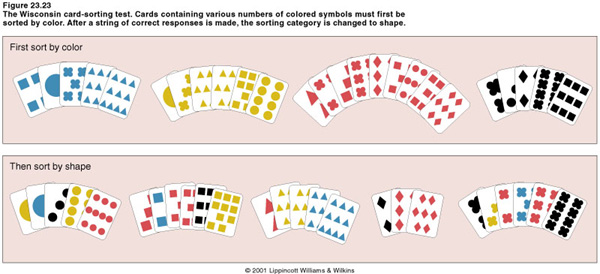Wisconsin card sort test
From Psy3242
| (3 intermediate revisions not shown) | |||
| Line 8: | Line 8: | ||
[[Image:wisconsincardsort.jpg]] | [[Image:wisconsincardsort.jpg]] | ||
| + | [[Image:Example.jpg]] | ||
| + | |||
| + | Wisconsin Card Sorting Test | ||
| + | '''The Wisconsin Card Sorting Test''' (WCST) is a neuropsychological test of "set-shifting", i.e. the ability to display flexibility in the face of changing schedules of reinforcement. | ||
| + | When the test was first invented it was done with the experimenter sitting across a table from from the participant, now in present day it can be done on the computer in about 12- 20 minutes. The way it is conducted is the participant is handed a set stimulus cards. Then the participant is given another set of cards. He or she is asked to match the cards. The person conducting the experiment does not tell the participant how to match, but they do tell the person whether it is a right or wrong match. | ||
| + | The test’s clinical use is very vital to studies. It is used by [[neurologists, neuropsychologists, clinical psychologists and psychiatrists]]. The "normal" participant in this study is someone who is suffering from acquired brain injury, neurodegenerative disease, and mental illness such as schizophrenia. In order to complete the test a the participant has to be able to perform cognitive functions such as attention and working memory. The test is loosely caoined a "frontal lobe test". | ||
Current revision as of 02:02, 28 April 2008
Links
Wisconsin Card Sorting Test The Wisconsin Card Sorting Test (WCST) is a neuropsychological test of "set-shifting", i.e. the ability to display flexibility in the face of changing schedules of reinforcement. When the test was first invented it was done with the experimenter sitting across a table from from the participant, now in present day it can be done on the computer in about 12- 20 minutes. The way it is conducted is the participant is handed a set stimulus cards. Then the participant is given another set of cards. He or she is asked to match the cards. The person conducting the experiment does not tell the participant how to match, but they do tell the person whether it is a right or wrong match. The test’s clinical use is very vital to studies. It is used by neurologists, neuropsychologists, clinical psychologists and psychiatrists. The "normal" participant in this study is someone who is suffering from acquired brain injury, neurodegenerative disease, and mental illness such as schizophrenia. In order to complete the test a the participant has to be able to perform cognitive functions such as attention and working memory. The test is loosely caoined a "frontal lobe test".

